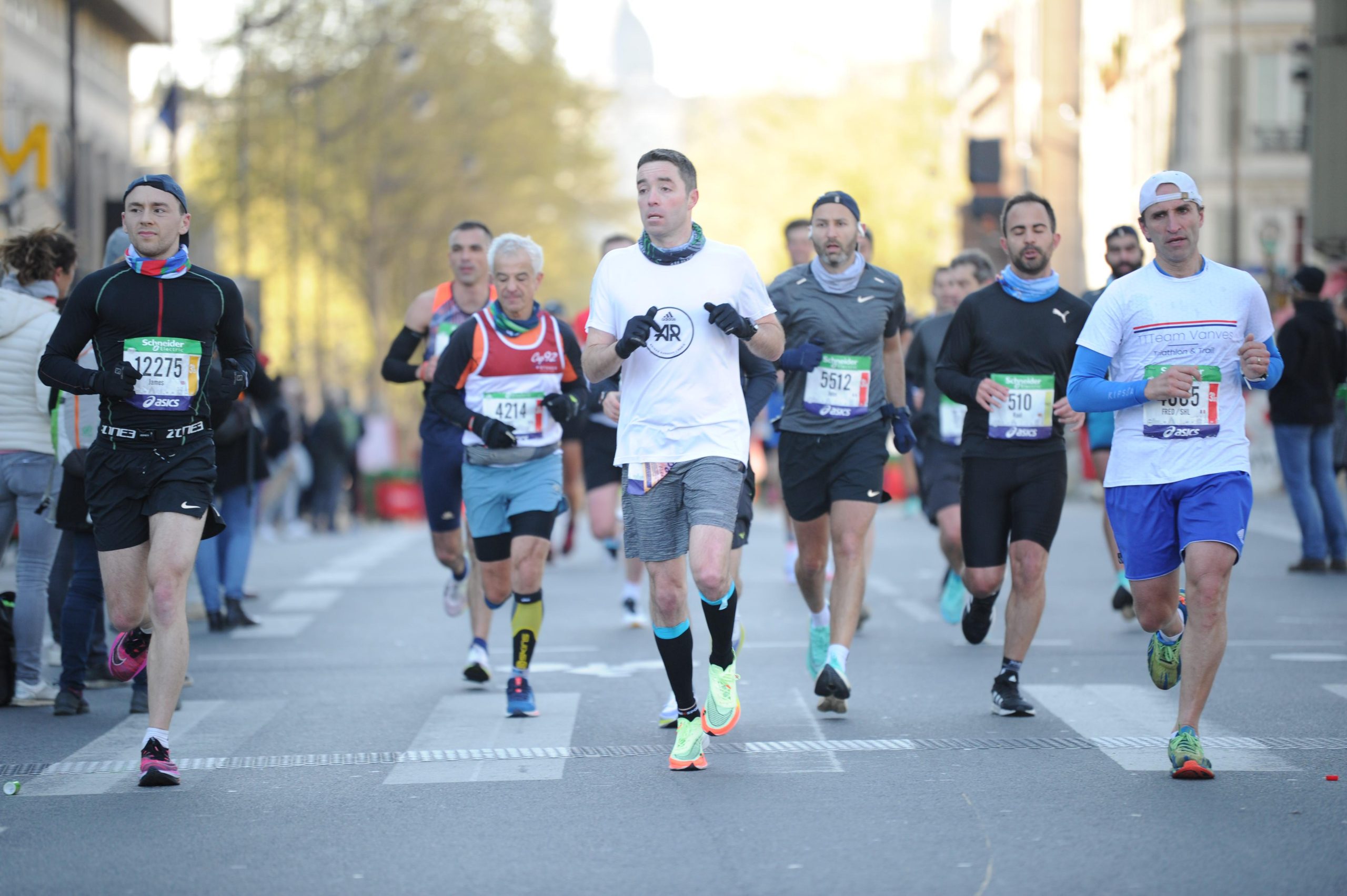This weekend I ran Paris Marathon, my fifth attempt at the marathon distance (if you include the Ironman) and my third marathon race.

Overall, it was awesome! Hearing thousands of people chanting “Allez, allez, allez!” made me feel like I was in the Tour de France, and parts of the course were stunning. I felt particularly overwhelmed by emotion the first time I spotted the Eiffel Tower as we ran down the Seine. At that exact moment, I remember thinking “This is a bucket list item that I might never experience again in my life” and I did my best to savour every minute.
With friends and on social media, I celebrated a new Personal best of 3:09:00 – six minutes faster than London Marathon just six months ago!
In private, and with my coach, I was disappointed to fall short of my 2h55 target.
Why had I chosen 2h55?
When I entered Paris Marathon a few months ago, it had been slightly on a whim, and setting a scorching new PB wasn’t really a priority. I think I entered a predicted time of 3h10, 5mins faster than London.
My coach and I had agreed that Paris was one of my “C Races” this year.
So, what’s a “C Race”?
Typically, athletes divide a race season into A Races and B Races. An A race is a top priority event, and it’s the event you structure your training around primarily. Most amateurs wouldn’t have more than one A Race in a year.
B Races can be thought of as supporting races, and are usually shorter or easier than an A Race. They’re good for race practice, and they’re good for benchmarking performance midway through a season. The idea is that you don’t absolutely destroy yourself in a B Race. You go out hard, but knowing that it’s not the race that ultimately matters that year, which takes the pressure off.
For me, Ironman Wales in September is my A Race this year, and I’m doing two Half Ironmans at the start of June and end of July as my B Races.
My training is entirely focused around the Ironman, and I’ve been following a triathlon training programme since the start of the year. I haven’t paid attention to any marathon plans, and have worked on the basis that all-round endurance and strength will translate into good results across all three disciplines.
I had set some surprisingly fast 10k and Half Marathon PBs in February and March, so as Paris approached, I started thinking that this might be the race where I broke the 3-hour barrier for the first time… I felt even more buoyed by the Jack Daniels calculator that was giving me a predicted time of 2h48m!
I had to keep reminding myself that Paris was a C race, so disregarded the predicted time of 2h48 and set a target 2h55. This was a pretty punchy 20-min reduction on my London time, which made me slightly nervous, but I was feeling on good form and thought I might as well go for it.
The race itself went more or less to plan…until 25km. My legs and feet started to hurt, and my pace started dropping pretty quickly. By 26km, I knew that 2h55 wasn’t happening. and by 32km, I knew that sub-3 wasn’t happening, so gritted my teeth and just pushed for a new PB.
To be honest, I don’t know whether I was actually ready to run a 2h55 marathon yesterday, but having reflected on my preparation, I think there are a handful of things I could have done differently to give myself a better chance of success.
Six Lessons Learned (the hard way) at Paris Marathon
1. Prioritise sleep in the lead-up to a big race
One of the biggest things I’ll do differently when travelling to a race abroad is to plan travel at sensible times in order to maximise sleep, even if that means spending more on tickets.
In my haste to save money, I booked a Eurostar at 6am on Friday (two days before the race). This meant being at the station by 5am, and therefore having to wake up at 4am. As usual, I left my packing to the last minute, and then lay in bed feeling slightly stressed about the possibility of my alarms not working and missing the train. I slept really poorly, and my plan to have a nap on the Eurostar was thwarted by some extremely noisy children in the seats behind me.
By Friday evening, I had reached a point of sleep deprivation that I hadn’t felt in a very long time, and this must have taken a toll on my body. Next time, I’ll be making sure I get at absolute minimum of 7hrs sleep every night in the week before race.
2. Plan minimal activities in the 2-3 days before a race
I arrived in Paris at 9am on Friday, and spent the day wandering around the city with two heavy bags. I got coffee, went to some shops, then walked around the Louvre for a couple of hours. By the time I got back to the apartment, I was shocked to see my step count at 21,000 steps.
I tried to minimise walking the following day, but had to go into central Paris to pick up my race number. I also tried to squeeze in a 4km run that was originally planned for the Friday, which meant my step count for Saturday was 16,000. Waaay too high for the day before a marathon.
I remember speaking to my physio about a week before London Marathon last year, and he advised “using your legs as little as possible the day beforehand. Try to spend as much time sitting down as you can.”
This is easily done when you’re at home, but gets harder when you’re travelling and visiting a new city. Next time I do a race abroad, I’ll try to sort everything out two days before the race so that I can spend as much of the Saturday sitting down as possible.
3. Sort out raceday nutrition before 8pm night before
Common race advice is to minimise stress in the week before a race, and this is something I just failed to do.
By 7pm the night before the race, I still didn’t have dinner sorted, and didn’t have anything in the apartment for raceday breakfast either! After buying some pasta, I wandered round some local shops in an unsuccessful quest for bagels and peanut butter, and ended up settling for bread and Nutella. Nutritionally, I don’t think this was quite as good as PB Bagels, but it was also just another small source of stress that unnerved me and prevented me from “spending as much time sitting down as possible”.
4. Sort out race kit weeks in advance
On the theme of minimising stress, I should have checked all my raceday weeks in advance and made sure I had everything at least two weeks in advance so I could do a few runs in it. Instead, I discovered 48hrs before the race that my shorts had a hole in them, so spent a couple of hours hunting for the same pair of shorts in various Paris running shops. Next time, I’ll make sure everything is ready weeks in advance.
5. Don’t switch to new shoes 2 weeks beforehand
I was very lucky to be given a pair of Nike Alphaflys (carbon-plated super shoes) by ProDirectRunning in March, and decided it would be rude not to use them in the marathon. They felt insanely fast on the track and super responsive on shorter tempo runs, and seemed to have less of an impact on my calves than my Saucony Endorphin Speeds. I did one 25km long run in them 2 weeks before the marathon, and apart from a little bit of tightness around my toes, they felt pretty good.
On race day, unfortunately, I blistered pretty hard on the soles of my feet, and I think this was because my feet simply weren’t used to running long distances in the shoe. If I’d done all my long runs in them, I presume the soles of my feet would have calloused in places where impact was highest, and I might not have been in so much discomfort on race day.
I’ve known for years that you should spend a month or so in new shoes before racing long distances in them, but for some reason I thought I could get away with a last-minute switch this time. Lesson learned.
6. More strength training
If you’ve read any of my previous running/triathlon posts, you’ll know that I’m becoming a broken record on this topic, but… “I wish I’d done more strength training”.
I definitely did more in the 3mo before Paris than I did in the 3mo before London, but I’ve probably missed a handful of sessions over the last 3 months that would have benefitted me immensely during those final 12kms .
I met some ultra runners last year who said they spend almost as much time in the gym as they do running, and I can see why. I’ll be continuing to do as much S&C as possible in the run-up to Ironman Wales.
So there we have it. Six lessons learned from Paris Marathon 2022.
Overall, I’m happy with a new PB, and had a really fun weekend in Paris. The marathon is an unpredictable beast, and I should have known that strong performances in shorter distances weren’t a surefire predictor of marathon success.
Triathlon race season is about to kick off, and my last race isn’t until September, so It’s unlikely that I’ll do another marathon in 2022. Whenever I do run my next marathon, though, you can be sure that I’ll be getting even closer to going sub-3.
